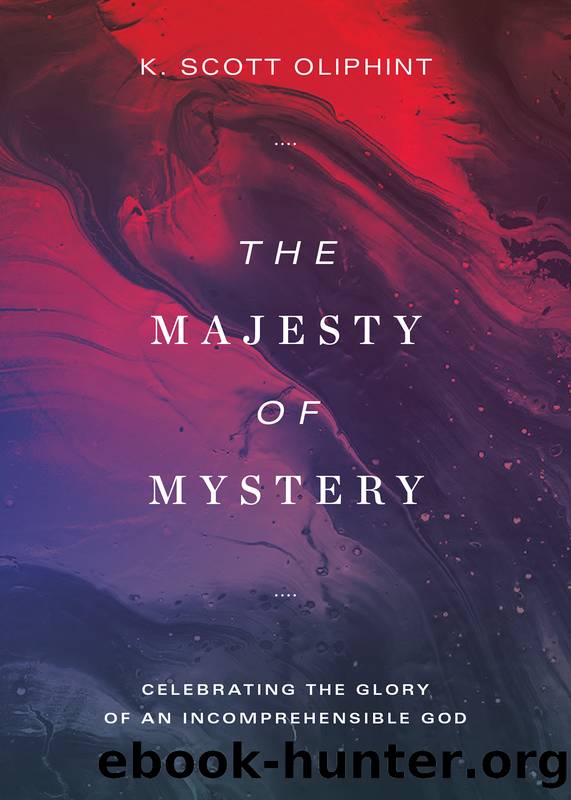The Majesty of Mystery by K. Scott Oliphint

Author:K. Scott Oliphint
Language: eng
Format: epub
Tags: Theology, Doctrinal--Popular works.
Publisher: Bellingham, WA
Published: 2016-08-15T00:00:00+00:00
The Slavery of Sin
Readers aware of the Reformed view of sin and its consequences might feel a little uneasy at this point in our discussion. Reformed theology has consistently affirmed that we are all âdead in [our] trespasses and sinsâ (Eph 2:1); that âthe natural person does not accept the things of the Spirit of God, for they are folly to him, and he is not able to understand them because they are spiritually discernedâ (1 Cor 2:14, my emphasis); that âthe mind that is set on the flesh is hostile to God, for it does not submit to Godâs law; indeed, it cannotâ (Rom 8:7, my emphasis). Scripture is clear that sin has caused spiritual death (not simply sickness) in us; it has rendered us unable to understand the âthings of the Spiritâ; it has enslaved our thinking so that we cannot submit to God. How, then, dare we speak of a âfreedomâ of the will, when Scripture is clear that the fallen will cannot choose for Christ?
As we might expect by this point, we meet our friend mystery again in this question. But it might help to recognize another distinction that is important to make in this context. In the first section of the Westminster Confession, chapter 9, we highlighted (above) the affirmation that there is no âabsolute necessity of natureâ when it comes to the will of man. So the will is naturally free. âNaturalâ freedom refers to the image of God. Since we are image of God, we always have the ability to choose. Just as being the image of God means we retain the ability to think, so also with the will. It is the willâs âjob,â as it were, to choose; if there is a will, there must be choice. Since we have a will, even after the fall, it must retain its natural ability to choose.
But just because we have the natural ability to choose, that does not mean we have, as Adam and Eve did, the ability to choose either good or evil. Since the fall into sin, since we are dead in our sins apart from Christ, we have lost the ability to choose for Christ. But we still choose, because sin did not destroy the image of God that we are as Godâs human creatures. The will always chooses, but it chooses according to the nature of the person choosing. In the garden, Adamâs will could choose to obey or disobey. After the fall, we still choose, but we always choose what we want, and we always want sin. Our depravity does not mean that we do not choose; it means that, in our sin, we always choose sin. When weâre converted to Christ, there is a change of our nature, so that we can choose either to obey or disobey, just as Adam could. In the new heaven and new earth, since weâour natureâwill be glorified, we will still choose, but we will always and only choose the good. In none of these cases do we lose our wills; the will remains in its natural state.
Download
This site does not store any files on its server. We only index and link to content provided by other sites. Please contact the content providers to delete copyright contents if any and email us, we'll remove relevant links or contents immediately.
| Catechisms | Devotionals |
| Hymns & Hymnals | Meditations |
| Monasticism & Asceticism | Pentecostal & Charismatic |
| Prayerbooks | Rites & Ceremonies |
| Sacraments |
Fangirl by Rainbow Rowell(9228)
How to Bang a Billionaire by Alexis Hall(8145)
Wonder by R. J. Palacio(8097)
The Thirst by Nesbo Jo(6930)
The Space Between by Michelle L. Teichman(6927)
Assassin’s Fate by Robin Hobb(6198)
Wiseguy by Nicholas Pileggi(5769)
The Night Circus by Erin Morgenstern(5215)
Paper Towns by Green John(5177)
The Kite Runner by Khaled Hosseini(5165)
Bittersweet (True North #1) by Sarina Bowen(4842)
Gerald's Game by Stephen King(4641)
Too Much and Not the Mood by Durga Chew-Bose(4337)
Pillow Thoughts by Courtney Peppernell(4271)
Goodbye Paradise(3798)
Twelve Days of Christmas by Debbie Macomber(3559)
Good by S. Walden(3547)
The Rosie Effect by Graeme Simsion(3459)
The Cellar by Natasha Preston(3333)
